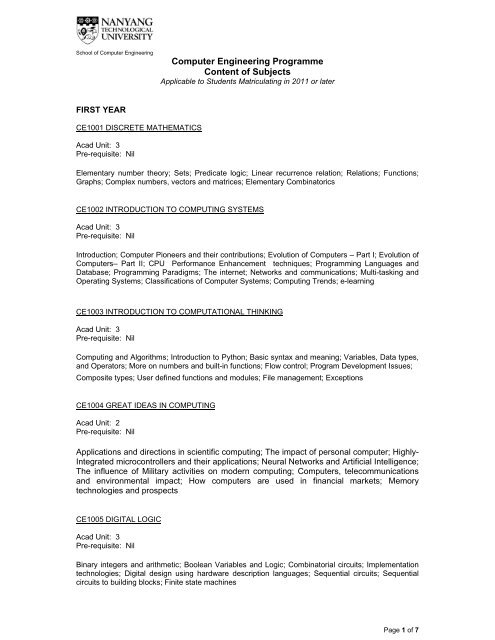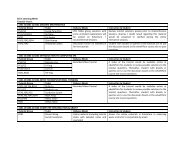You also want an ePaper? Increase the reach of your titles
YUMPU automatically turns print PDFs into web optimized ePapers that Google loves.
School of Computer Engineering<br />
FIRST YEAR<br />
CE1001 DISCRETE MATHEMATICS<br />
Acad Unit: 3<br />
Pre-requisite: Nil<br />
Computer Engineering Programme<br />
<strong>Content</strong> of Subjects<br />
Applicable to Students Matriculating in 2011 or later<br />
Elementary number theory; Sets; Predicate logic; Linear recurrence relation; Relations; Functions;<br />
Graphs; Complex numbers, vectors and matrices; Elementary Combinatorics<br />
CE1002 INTRODUCTION TO COMPUTING SYSTEMS<br />
Acad Unit: 3<br />
Pre-requisite: Nil<br />
Introduction; Computer Pioneers and their contributions; Evolution of Computers – Part I; Evolution of<br />
Computers– Part II; CPU Performance Enhancement techniques; Programming Languages and<br />
Database; Programming Paradigms; The internet; Networks and communications; Multi-tasking and<br />
Operating Systems; Classifications of Computer Systems; Computing Trends; e-learning<br />
CE1003 INTRODUCTION TO COMPUTATIONAL THINKING<br />
Acad Unit: 3<br />
Pre-requisite: Nil<br />
Computing and Algorithms; Introduction to Python; Basic syntax and meaning; Variables, Data types,<br />
and Operators; More on numbers and built-in functions; Flow control; Program Development Issues;<br />
Composite types; User defined functions and modules; File management; Exceptions<br />
CE1004 GREAT IDEAS IN COMPUTING<br />
Acad Unit: 2<br />
Pre-requisite: Nil<br />
Applications and directions in scientific computing; The impact of personal computer; Highly-<br />
Integrated microcontrollers and their applications; Neural Networks and Artificial Intelligence;<br />
The influence of Military activities on modern computing; Computers, telecommunications<br />
and environmental impact; How computers are used in financial markets; Memory<br />
technologies and prospects<br />
CE1005 DIGITAL LOGIC<br />
Acad Unit: 3<br />
Pre-requisite: Nil<br />
Binary integers and arithmetic; Boolean Variables and Logic; Combinatorial circuits; Implementation<br />
technologies; Digital design using hardware description languages; Sequential circuits; Sequential<br />
circuits to building blocks; Finite state machines<br />
Page 1 of 7
School of Computer Engineering<br />
CE1006 COMPUTER ORGANISATION AND ARCHITECTURE<br />
Acad Unit: 3<br />
Pre-requisite: CE1005 (can be taken concurrently)<br />
Computer Hardware Decomposition; Data Representation, Memory Allocation and Access; Central<br />
Processing Unit; Assembly Programming and Instruction Set Architecture; High-level Software to<br />
Low-level Instructions; Computer Memory; Data Transfer and Input/Output (I/O) Techniques;<br />
Computer Arithmetic; Measuring system performance; Towards higher speed<br />
CE1007 DATA STRUCTURES<br />
Acad Unit: 3<br />
Pre-requisite: CE1003<br />
Basic Constructs in CC program structure, Syntax and semantics; Built-in Data Structures; Recursion;<br />
Memory Management in C; Linked Lists; Tree Structures; Implementing other data abstractions<br />
CE1008 ENGINEERING MATHEMATICS<br />
Acad Unit: 3<br />
Pre-requisite: Nil<br />
Precalculus: Functions and graphs; Limits and continuity; Derivatives and applications; Integrals and<br />
applications; First order differential equations; Infinite series; Descriptive statistics; Probability theory<br />
Probability and sampling distributions; Inferential statistics; Experimental and Numerical Methods<br />
CE0001 ENGINEERS AND SOCIETY<br />
Acad Unit: 3<br />
Pre-requisite: Nil<br />
This course raises issues pertinent to engineers as professionals as well as members of society. It<br />
discusses the requirements and issues of the IT profession, examining the key role professionals play<br />
with their contributions to society. Current concerns will be raised of interest to any person living in<br />
Singapore.<br />
Page 2 of 7
School of Computer Engineering<br />
SECOND YEAR<br />
CE2001 ALGORITHMS<br />
Acad Unit: 3<br />
Pre-requisite: CE1001, CE1007<br />
Introduction to algorithms, basics for analysis of algorithms, sorting, searching, graphs, basic<br />
computability and complexity theory<br />
CE2002 OBJECT ORIENTED DESIGN AND PROGRAMMING<br />
Acad Unit: 3<br />
Pre-requisite: CE1007<br />
Introduction to Object Orientated Programming; Interface and implementation; Designing with<br />
Classes and Objects; Inheritance and polymorphism; Object Relationships; Framework and Reuse;<br />
Persistent Objects; Design patterns; Object Oriented Programming Language<br />
CE2003 DIGITAL SYSTEMS DESIGN<br />
Acad Unit: 3<br />
Pre-requisite: CE1005<br />
Review of Hardware Description Languages; Real-World Arithmetic; Control and Datapath design;<br />
Register Transfer Level (RTL) design in Verilog; Digital Design on FPGAs; Testbenches and Testing<br />
Strategies; Using design in registers, counters, shift registers, synchronous and asynchronous reset<br />
CE2004 CIRCUITS AND SIGNAL ANALYSIS<br />
Academic Unit: .3<br />
Pre-requisite: CE1008<br />
DC Signal Analysis; DC Signal Analysis; AC Signal Analysis; AC Signal Analysis; Signals; Systems<br />
and time-based system analysis; Frequency-based System Analysis<br />
CE2005 OPERATING SYSTEMS<br />
Acad Unit: 3<br />
Pre-requisite: CE1007<br />
Overview of Operating Systems (OS); Processes and Threads; Process Scheduling; Deadlock and<br />
Starvation; Memory Organization; Virtual Memory Management; File System Organization and<br />
Implementation; Input/Output (I/O) Management and Disk Scheduling; Issues in Real-time Operating<br />
Systems; Protection and Security<br />
CE2006 SOFTWARE ENGINEERING<br />
Acad Unit: 3<br />
Pre-requisite: CE1007 (can be taken concurrently)<br />
Page 3 of 7
School of Computer Engineering<br />
Introduction to Software Engineering; Software Engineering Process; Introduction to Requirements;<br />
Introduction to Software Specifications; Software Design and Construction; Testing and Integration;<br />
Software Maintenance; Software Project Management; Software Quality; Dependability and Security<br />
CE2007 MICROPROCESSOR-BASED SYSTEMS DESIGN<br />
Acad Unit: 3<br />
Pre-requisite: CE1006, CE2004 (can be taken concurrently)<br />
Microprocessor landscape; Microprocessor packages, signals and interfacing – Part 1; Introduction to<br />
ARM Cortex-M Architecture and Programming; Peripherals, interfaces and applications – Part 1;<br />
Analog signal conditioning and Interfacing Displays; Signals and interfacing – Part 2; Peripherals,<br />
interfaces and applications – Part 2; Semiconductor memory technology and characteristics;<br />
Fabrication; System Design Issues; Further integration and programming<br />
CE0002 GREEN COMPUTING<br />
Acad Unit: 3<br />
Pre-requisite: Nil<br />
Introduction to Green Computing; eLearning; Energy; Green design; Green manufacturing; Green<br />
use; Green disposal; Other issues; Common sense approaches to green computing; Green<br />
applications<br />
Page 4 of 7
School of Computer Engineering<br />
THIRD YEAR<br />
CE3001 ADVANCED COMPUTER ARCHITECTURE<br />
Acad Unit: 3<br />
Pre-requisite: CE1006<br />
Introduction to Computer System; The CPU Architecture; Performance Enhancements & Instruction-<br />
Level Parallelism; Memory Systems; Data-Level Parallelism in Vector, SIMD, and GPU<br />
Architectures; Multiprocessors and Thread-Level Parallelism; Warehouse-Scale Computing:<br />
Exploiting Request-Level and Data-Level Parallelism; Future directions<br />
CE 3002 SENSORS, INTERFACING AND CONTROL *subject to change<br />
Acad Unit: 3<br />
Pre-requisite: CE1006<br />
Overview of electronic instrumentation and control systems; Sensors and Transducers; Signal<br />
Conditioning; Digital Interfaces; Introduction to control system; Design of Digital Control; Linear<br />
Discrete Data System<br />
CE3005 COMPUTER NETWORKS<br />
Acad Unit: 3<br />
Pre-requisite: Nil<br />
Computer Network Concepts; Network Types and Performances; Data Link Layer; Local Area<br />
Networks; Network Layer; Transport Layer; Application Layer<br />
CE3006 DIGITAL COMMUNICATIONS<br />
Acad Unit: 3<br />
Pre-requisite: CE2004<br />
Introduction; Signals and spectra; Baseband modulation, demodulation/detection; Band-pass<br />
modulation, demodulation/detection; Source coding; Channel coding; Challenges in communication<br />
system design<br />
Page 5 of 7
School of Computer Engineering<br />
FOURTH YEAR<br />
TECHNICAL ELECTIVES<br />
NETWORKING & MOBILITY SPECIALISATION<br />
CE/CZ4021 PERVASIVE NETWORKS<br />
Acad Unit: 3<br />
Pre-requisite: CE3005 or CZ3006<br />
The objective of this course is to introduce different types of wireless network technologies and some<br />
important mobile services and applications to support pervasive computing. The subject consists of<br />
two complementary components, i.e., wireless network protocol and mobility management. In the<br />
wireless network protocol part, various protocols in different layers designed to support wireless data<br />
transfer will be presented. In the mobility management, the required mechanisms to support data<br />
transfer with users’ mobility will be discussed. After attending this course, the students will be able to<br />
appreciate the various technical challenges associated with wireless networking and develop a basic<br />
understanding of the solutions proposed to overcome the challenges, and the principles behind them.<br />
In addition, the students will acquire working knowledge of the principles of and issues related to<br />
location management, and mobile multimedia services.<br />
CE/CZ4022 PERSONAL MOBILE COMMUNICATIONS<br />
Acad Unit: 3<br />
Pre-requisite: CE3005 or CZ3006<br />
Digital wireless communication systems are becoming increasingly important in today’s context. With<br />
rapid advancements that are being made in digital technology coupled with the flexibility that digital<br />
systems offer, it has become evident that these systems will not only out perform analog system but<br />
may in the near future replace them.<br />
In this subject, the primary focus will be on the physical layer in which emphasis is placed on<br />
fundamentals of radio propagation and communication theoretic aspects of different types of multiple<br />
access techniques. An introductory exposure of the principles will be covered. Each topic will be<br />
followed with problems that reinforce concepts learned and will help develop an improved<br />
understanding of wireless mobile communications<br />
CE/CZ4023 ADVANCED COMPUTER NETWORKS<br />
Acad Unit: 3<br />
Pre-requisite: CE3005 or CZ3006<br />
This course provides a top-down overview of computer networks, focusing on the principles of<br />
application layer. In other words, we aim at introducing the know-how of developing Internet<br />
applications, which is mostly demanded by computer networking industries. Based on the prerequisite<br />
of understanding transport protocols and whatever below them, we discuss application layer protocols<br />
such as HTTP, FTP, SMTP, DNS. Given recent intensive progress on multimedia networking, we also<br />
give more emphasis on multimedia applications and QoS requirements, and we discuss related<br />
protocols and concepts, including for example Real-Time Streaming Protocol (RTSP) and Real-time<br />
Transport Protocol (RTP), as well as Integrated services and Differentiated services.<br />
CE/CZ4024 CRYPTOGRAPHY AND NETWORK SECURITY<br />
Acad Unit: 3<br />
Pre-requisite: CE3005 or CZ3006<br />
Page 6 of 7
School of Computer Engineering<br />
The course aims at exposing computer engineering students to principles and efficient<br />
implementations of cryptographic techniques /components for protection of networked computers and<br />
secure communications over an open network. Coverage include: Threats and security services in an<br />
opened computer network; foundation mathematics underlying practical cryptographic techniques<br />
(basic number theory and algebraic finite fields); Established cryptographic algorithms including AES,<br />
RC4, RSA, and other public key algorithms that based on discrete logarithm of finite algebraic groups,<br />
Cryptographic hashes; Message authentications and block cipher chaining; Lightweight cryptography,<br />
Cryptographic protocols for authentication and key distribution; Key management. The course does<br />
not address other important network security techniques that are built upon firewalls, intrusion<br />
detections and security auditing. Students who dislike mathematics and logic (for reasoning) and/or<br />
computer arithmetic are advised to consider carefully when enrolling this course.<br />
Page 7 of 7




